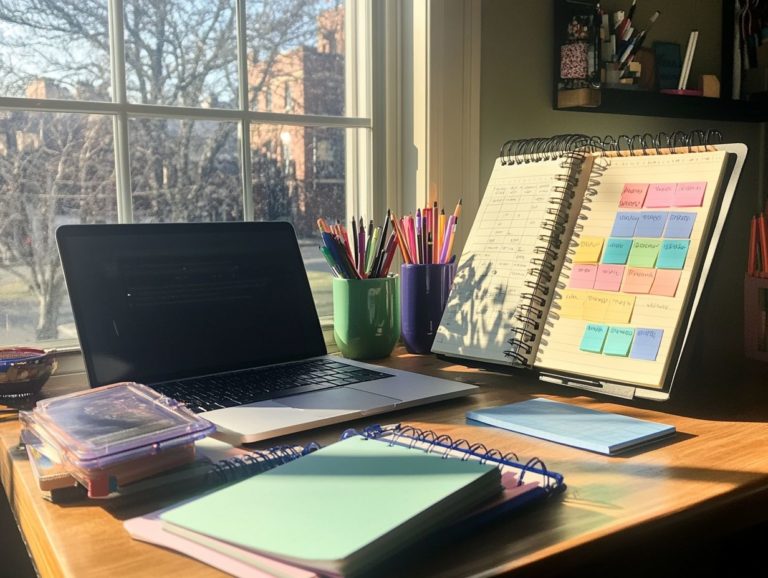top 7 last-minute test prep strategies
As exams draw near, the pressure to excel can seem insurmountable. Whether you find yourself racing the clock or striving to consolidate your knowledge, implementing effective last-minute study strategies can truly transform your experience.
Here are seven techniques to help you optimize your study time, ranging from crafting a practical schedule to maintaining calm and focus on the day of the test.
Get ready to face your exams with full confidence and make the most of those crucial final hours of preparation!
Contents
- Key Takeaways:
- 1. Create a Study Schedule and Stick to It
- 2. Focus on the Most Important Topics
- 3. Use Flashcards for Quick Review
- 4. Practice with Past Exams or Sample Questions
- 5. Get Enough Sleep the Night Before the Test
- 6. Eat a Nutritious Breakfast
- 7. Stay Calm and Positive
- How Can You Make the Most of Your Last-Minute Studying?
- What Are the Best Ways to Manage Test Anxiety?
- How Can You Stay Focused During the Test?
- What Are the Most Effective Study Techniques for Last-Minute Prep?
- How Can You Prioritize Your Study Time for Maximum Results?
- What Are the Benefits of Group Study Sessions?
- How Can You Stay Motivated During Last-Minute Studying?
- What Are the Most Common Mistakes to Avoid During Last-Minute Test Prep?
- Frequently Asked Questions
- What are the top 7 last-minute test prep strategies?
- Why is it important to create a study schedule?
- How can flashcards help with last-minute test prep?
- Should I review past assignments or quizzes?
- How can taking practice tests improve my test performance?
- Why is sleep important for last-minute test prep?
- What should I eat for breakfast on the day of the test?
Key Takeaways:
Create a study schedule and stick to it to keep yourself organized and on track during last-minute test prep. Focus on the most important topics to optimize your studying and prioritize your time effectively. Use flashcards for quick review to reinforce key concepts and improve retention of information.
1. Create a Study Schedule and Stick to It
Creating a study schedule is essential for you as a high school student preparing for tests. It s not just about organizing your materials; it s also a powerful way to reduce anxiety by giving you ample time to review and practice.
This ultimately leads to better performance on exam day. To craft an effective study schedule, begin by assessing your strengths and weaknesses in each subject.
Prioritizing the areas that need more attention is crucial. However, don t forget to maintain a balanced approach across all topics.
Set specific times for studying different materials think textbooks, study guides, and practice exams to reinforce your knowledge.
To stick to your schedule, consider setting short-term goals and using timers. These strategies can create a sense of urgency that keeps you focused.
With this structure in place, you ll likely find your confidence growing as you see your gradual progress, leading to improved performance and lower stress levels when exams roll around.
2. Focus on the Most Important Topics
Focusing on the most important topics during your exam preparation gives you the power to deepen your understanding and mastery of key concepts, significantly enhancing your chances of achieving a higher grade.
To effectively identify these crucial areas, consider reviewing past exams and seeking guidance from your teachers. These resources often reveal recurring themes and topics that carry substantial weight in assessments.
By analyzing past papers, you can pinpoint which subjects appear more frequently, enabling you to tailor your study sessions for maximum impact.
Engaging in discussions with educators about their teaching priorities will provide further clarity on essential topics. Prioritizing your learning involves crafting a structured study schedule that allocates ample time for these key subjects.
This fosters deeper comprehension and retention of the material in the lead-up to your exams.
3. Use Flashcards for Quick Review
Using flashcards can greatly improve your memory and understanding of key concepts, making them an exceptional study method as you prepare for various types of exams.
By presenting information in bite-sized pieces, flashcards encourage active recall, which is essential for solidifying your knowledge.
This technique transforms passive learning into an interactive experience that truly resonates.
To create effective flashcards, focus on concise definitions, incorporate images for visual engagement, and use memory aids that help you remember information.
By integrating flashcards into your regular study routine whether you review them daily or during breaks you can further reinforce comprehension and retention, facilitating a well-rounded approach to mastering the subject matter.
4. Practice with Past Exams or Sample Questions
Practicing with past exams or sample questions arms you with the essential skills and familiarity needed to tackle the various types of questions you might face during your tests.
This ultimately boosts your confidence significantly as you prepare. By sourcing practice exams from a variety of reputable resources such as educational websites, official exam boards, and study groups you can replicate the testing experience more accurately.
This simulation of exam conditions is vital; it helps you get accustomed to the timing, pressure, and format of questions, which can significantly alleviate any anxiety you may feel.
Such practice allows you to identify areas where your understanding might be lacking, enabling you to focus your revision efforts more strategically.
In this way, practice exams also reinforce knowledge and serve as a roadmap for targeted improvement.
5. Get Enough Sleep the Night Before the Test
Adequate sleep the night before a test is essential. It plays a vital role in your thinking skills and memory, helping you stay focused during the exam.
Rested students often perform better academically. Without sleep, anxiety can increase, making concentration difficult.
To improve your sleep quality, try these steps:
- Establish a calming bedtime routine.
- Limit screens at least an hour before bed.
- Create a comfortable sleeping environment.
Relaxation techniques like deep breathing can help reduce anxiety. This will prepare you for exams with a clear, focused mind.
6. Eat a Nutritious Breakfast
Start your day with a nutritious breakfast! It boosts your energy and sharpens your mind for those crucial exam moments.
Incorporating a variety of foods like whole grains, fruits, and proteins ensures a steady energy release, enhancing your focus.
Whole grain toast or oatmeal provides complex carbohydrates that fuel your brain gradually. Fruits like berries and bananas deliver vital nutrients to support your brain functions.
Protein-rich options such as eggs or yogurt are also important, as they enhance concentration.
As exam day approaches, maintaining a balanced diet is crucial. It sharpens your cognitive abilities and helps alleviate stress, ensuring you feel prepared and energized.
7. Stay Calm and Positive
Maintaining a calm and positive mindset is vital for managing exam anxiety. It enhances your focus and nurtures confidence.
Try relaxation techniques like deep breathing exercises, mindfulness meditation, or progressive muscle relaxation to lower your stress levels.
Using positive affirmations such as “I am prepared” or “I can handle this” shifts your mindset from fear to confidence. This gives you the power to face challenges with resilience.
The impact of a positive attitude is profound. It boosts your performance in exams and fosters self-assurance in other areas of your life.
How Can You Make the Most of Your Last-Minute Studying?
Maximizing your last-minute studying means strategically reviewing key materials while using effective techniques to maintain focus and reduce anxiety.
Start by identifying crucial topics and align your review sessions accordingly. Prioritizing material based on importance or difficulty lets you make the most of your limited time.
Active recall methods, like quizzing yourself or explaining concepts to a peer, deepen your understanding and retention.
Practicing relaxation techniques like deep breathing exercises can also reduce stress and enhance your concentration, creating a balanced approach to last-minute revisions.
What Are the Best Ways to Manage Test Anxiety?
Managing test anxiety effectively is possible with a mix of relaxation techniques, positive visualization, and practice. This approach empowers you to face your exams with confidence.
Breathing exercises can work wonders to calm your nerves. Try the 4-7-8 technique: inhale for four counts, hold for seven, and exhale for eight. This method is effective before and during the exam.
Mindfulness techniques, such as grounding, can help anchor you in the present. Focus on your surroundings or the sensation of your feet on the floor to quell racing thoughts and redirect your attention to the task at hand.
By managing your anxiety effectively, you can prepare for exams with confidence and clarity.
How Can You Stay Focused During the Test?
Staying focused during a test is essential for success. Use techniques to maintain concentration and manage time effectively.
Structured time management helps you tackle questions without feeling overwhelmed.
Organized note-taking allows quick reviews during the exam. Mindful breathing techniques enhance mental clarity and reduce anxiety.
Break complex questions into smaller parts. This helps you understand better and keeps panic at bay.
Using this focused strategy will improve your performance and boost your confidence.
What Are the Most Effective Study Techniques for Last-Minute Prep?
For last-minute prep, effective techniques like actively remembering information, reviewing material at increasing intervals, and prioritization can boost your retention.
Actively remembering information helps you retain knowledge better through practice. Reviewing material at set intervals combats forgetting.
Prioritization focuses on important topics first, ensuring you grasp essential concepts before less critical content.
Combining these strategies makes the most of your time and enhances confidence during tests.
How Can You Prioritize Your Study Time for Maximum Results?
Effective prioritization of study time leads to maximum results. Target vital material to prepare efficiently.
Organize your study materials by complexity, importance, and familiarity. This creates a customized plan.
Categorize topics into tiers: crucial and challenging, somewhat familiar, and well-understood.
Self-assessment tools like quizzes help gauge understanding. Spend more time on challenging subjects to reinforce strengths.
What Are the Benefits of Group Study Sessions?
Group study sessions provide great benefits, such as enhanced learning and increased participation. They also clarify doubts with peers.
When you study with classmates, you access shared notes and materials, deepening your understanding.
Diverse perspectives in a group help you grasp topics better. One may simplify a concept while another adds depth.
This exchange creates motivation and accountability, leading to better retention. With effective dynamics, you enjoy the learning journey.
How Can You Stay Motivated During Last-Minute Studying?
Staying motivated during last-minute study sessions can feel overwhelming, but you can conquer it! Start by setting achievable goals and rewarding yourself for each milestone.
Create an inviting study environment to help maintain your focus and boost your productivity.
Timed study sessions work wonders. Use a timer for focused bursts of 25 minutes, followed by short breaks to recharge. After each session, reward yourself with a favorite snack or a refreshing walk.
Positive self-talk can also help you keep a constructive mindset, warding off doubts and anxiety.
To craft the perfect study atmosphere, eliminate distractions. Ensure your seating is comfortable and that you have plenty of light. Surrounding yourself with inspiring materials can turn your learning experience into something enjoyable and focused.
What Are the Most Common Mistakes to Avoid During Last-Minute Test Prep?
Avoid common mistakes like cramming, skimping on sleep, or getting lost in details instead of focusing on key topics. Recognizing these pitfalls can transform your study sessions into efficient, stress-free experiences.
Focus on prioritizing key concepts based on past exams or highlights from your syllabus instead of cramming everything into one frantic night. This strategy helps you understand and remember better.
Getting adequate rest before the test is essential. Sleep is crucial for memory consolidation.
Instead of fixating on intricate details that likely won t appear on the exam, practice active recall and spaced repetition. These methods enhance your learning and improve your outcomes.
Frequently Asked Questions
What are the top 7 last-minute test prep strategies?
- Create a study schedule
- Use flashcards
- Review past assignments or quizzes
- Take practice tests
- Get a good night’s sleep
- Eat a healthy breakfast
- Stay positive and confident
Why is it important to create a study schedule?
A study schedule helps you stay organized and focused on what you need to review. It ensures you have enough time to cover all necessary topics before the test.
How can flashcards help with last-minute test prep?
Flashcards are a simple and effective tool for memorizing key concepts. They’re portable and can be reviewed during short breaks throughout the day.
Should I review past assignments or quizzes?
Yes! Reviewing past assignments or quizzes helps you pinpoint areas to focus on and reinforces your understanding of the material.
How can taking practice tests improve my test performance?
Practice tests simulate the actual exam environment, helping you get familiar with potential questions. They also provide opportunities to practice time management and build confidence.
Why is sleep important for last-minute test prep?
A good night’s sleep boosts memory and concentration, making it easier to recall information during the test.
What should I eat for breakfast on the day of the test?
Choose a healthy breakfast with whole grains, protein, and fruits. This will give you the energy and focus needed for a successful test-taking experience.






